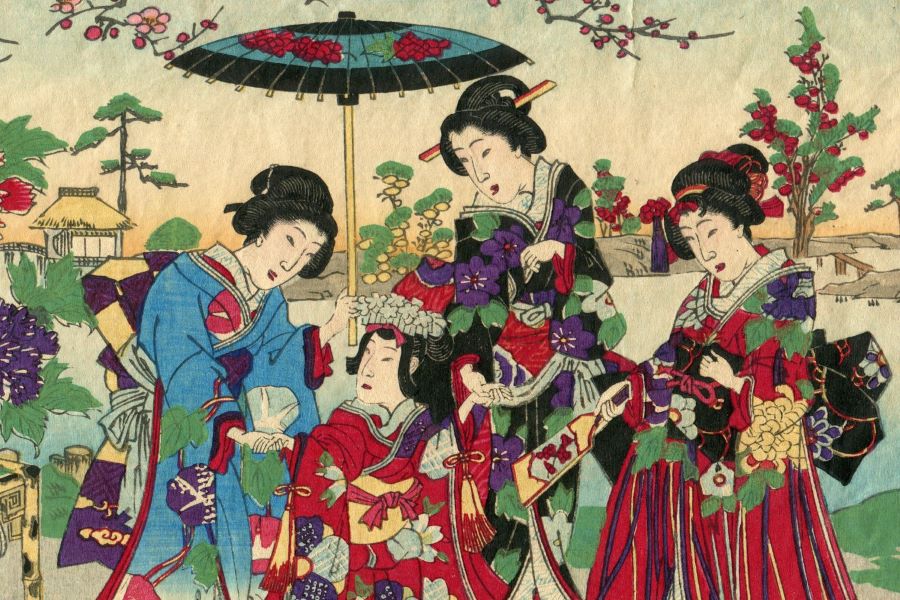 日本的出轨文化到底是什么样的
日本的出轨文化到底是什么样的
What is Cheating Culture in Japan Really Like?
译文简介
见多识广的各位,应该对“浮気”和“不倫”等词汇见得挺多的,可能心里隐隐都知道是什么意思了,然而确实如此吗?不妨看看这篇文章,将来查找资料的时候可能用得到^_^
正文翻译

题图。
For people in many cultures, cheating on a partner signifies the ultimate betrayal. However, a lot of online content has made it easy to be convinced that cheating is common in Japan. But what is the cheating culture in Japan really like, and how does cheating compare to those of other countries?
对于许多文化背景下的人来说,欺骗伴侣意味着终极背叛。然而,大量的网络内容很容易让人相信,出轨在日本很普遍。但是,日本的出轨文化到底是怎样的,与其他国家的出轨文化相比又如何呢?
Before diving in, two terms are used in Japanese to refer to different types of cheating. The word uwaki (浮気) refers to situations like drunken mistakes or cheating as a quick way to end a relationship. The second word, furin (不倫), refers to an extramarital affair. Based on the language, it is already apparent that uwaki, or “floating spirit,” is not always treated as a big deal.
对于许多文化背景下的人来说,欺骗伴侣意味着终极背叛。然而,大量的网络内容很容易让人相信,出轨在日本很普遍。但是,日本的出轨文化到底是怎样的,与其他国家的出轨文化相比又如何呢?
Before diving in, two terms are used in Japanese to refer to different types of cheating. The word uwaki (浮気) refers to situations like drunken mistakes or cheating as a quick way to end a relationship. The second word, furin (不倫), refers to an extramarital affair. Based on the language, it is already apparent that uwaki, or “floating spirit,” is not always treated as a big deal.
在深入探讨之前,我们先来了解一下日语中用来指代不同类型的出轨行为的两个术语。浮気(うわき)这个词,指的是酒后犯错或以出轨作为快速结束关系的方式等情况。第二个词是furin(不倫),指的是婚外情。从语言上可以看出,“浮気”(うわき)并不总是被当作特别大的事情来对待。
On the other hand, it seems that furin, which can best be translated as “adultery” or “immorality,” is taken very seriously. However, this has not always been the case.
另一方面,“不倫”(最适翻译为“通奸”或“不道德”)似乎很受重视。然而,情况也并非总是如此。
On the other hand, it seems that furin, which can best be translated as “adultery” or “immorality,” is taken very seriously. However, this has not always been the case.
另一方面,“不倫”(最适翻译为“通奸”或“不道德”)似乎很受重视。然而,情况也并非总是如此。
History of Cheating Culture in Japan
日本的出轨文化
日本的出轨文化

插图:艺伎一开始是男性的高级艺人,后期才出现了女性。
In many cultures, cheating on a partner is a serious crime. However, historically in Japan, marriages served to form alliances between families and secure the production of heirs. Romantic love played no role, with one proverb stating, “Those who come together in passion stay together in tears.” Instead, desires for passion and romance were typically satisfied outside one’s marriage, a common practice for both men and women.
在许多文化中,欺骗伴侣是一项严重的罪行。然而,在日本的历史上,婚姻的作用是在家族之间结成联盟,确保子嗣的繁衍。浪漫的爱情不起任何作用,有一句谚语说:“那些因激情而走到一起的人,最终留下的只剩泪水”。相反,对激情和浪漫的渴望通常在婚姻之外得到满足,这是男女双方的普遍做法。
在许多文化中,欺骗伴侣是一项严重的罪行。然而,在日本的历史上,婚姻的作用是在家族之间结成联盟,确保子嗣的繁衍。浪漫的爱情不起任何作用,有一句谚语说:“那些因激情而走到一起的人,最终留下的只剩泪水”。相反,对激情和浪漫的渴望通常在婚姻之外得到满足,这是男女双方的普遍做法。
In a patriarchal culture, there have always been more opportunities for men to cheat than women. For centuries, concubines and geisha, a word that literally means “artist” and describes traditional female performing artists, catered to wealthy men and held a respectable position in society. Even lower-class prostitutes did not receive as much stigma as they would in other cultures.
在父权制文化中,男人出轨的机会总是比女人多。几个世纪以来,妾和艺妓(字面意思是“艺术家”,一般指传统的女性表演艺术家)都是富裕男子的宠儿,在社会中拥有受人尊敬的地位。即使是下层妓女,也不会像在其他文化中那样受到鄙视。
在父权制文化中,男人出轨的机会总是比女人多。几个世纪以来,妾和艺妓(字面意思是“艺术家”,一般指传统的女性表演艺术家)都是富裕男子的宠儿,在社会中拥有受人尊敬的地位。即使是下层妓女,也不会像在其他文化中那样受到鄙视。
In the 20th century, perspectives shifted. Cheating came to be seen as common and inevitable husband behavior. Men worked to earn money for their families, while women were expected to stay home with their children. The reasoning was that the men deserved to relieve their stress however they saw fit, and yet a woman who cheated was considered to be disrespecting her husband and children.
20世纪时,人们的观点发生了转变。出轨逐渐被视为丈夫的常见、不可避免的行为。男人工作赚钱养家,而女人则要在家带孩子。其理由是,男人理应以他们认为合适的方式来缓解压力,而出轨的女人则被认为是对丈夫和孩子的不尊重。
原创翻译:龙腾网 https://www.ltaaa.cn 转载请注明出处
20世纪时,人们的观点发生了转变。出轨逐渐被视为丈夫的常见、不可避免的行为。男人工作赚钱养家,而女人则要在家带孩子。其理由是,男人理应以他们认为合适的方式来缓解压力,而出轨的女人则被认为是对丈夫和孩子的不尊重。
原创翻译:龙腾网 https://www.ltaaa.cn 转载请注明出处
Hostess Clubs and Sex Work
女公关俱乐部和性工作
女公关俱乐部和性工作

插图:歌舞伎町是东京的红灯区。
Japan’s nightlife culture is more secretive today, but the attitudes are similar as long ago. Activities that many cultures would consider cheating are not deemed as such in Japan. These activities are not only semi-legal but prent in larger Japanese cities.
如今,日本的夜生活文化更加隐秘,但人们的态度却与很久以前相似。在许多文化中被视为出轨的活动,在日本却不被视为出轨。这些活动不仅是半合法的,而且在日本较大的城市中非常普遍。
原创翻译:龙腾网 https://www.ltaaa.cn 转载请注明出处
如今,日本的夜生活文化更加隐秘,但人们的态度却与很久以前相似。在许多文化中被视为出轨的活动,在日本却不被视为出轨。这些活动不仅是半合法的,而且在日本较大的城市中非常普遍。
原创翻译:龙腾网 https://www.ltaaa.cn 转载请注明出处
After work, groups of businessmen often frequent various establishments catering to them. The tame options are kyabakura, or hostess clubs, “girls bars,” and “snack bars,” where female workers provide male patrons with drinks and flirty conversation. The same is true of host clubs catering to female customers. Other businesses, such as pink salons, soaplands and “delivery health,” offer more direct sexual services, even though prostitution is illegal in Japan.
下班后,成群结队的商人经常光顾为他们提供服务的各种场所。在这些场所,女工为男性顾客提供饮料和调情谈话。为女性顾客提供服务的男公关俱乐部也是如此。其他行业,如粉红沙龙、肥皂地和“健康快递”,提供更直接的性服务,尽管卖淫在日本是非法的。
下班后,成群结队的商人经常光顾为他们提供服务的各种场所。在这些场所,女工为男性顾客提供饮料和调情谈话。为女性顾客提供服务的男公关俱乐部也是如此。其他行业,如粉红沙龙、肥皂地和“健康快递”,提供更直接的性服务,尽管卖淫在日本是非法的。
Japanese law defines prostitution as sexual intercourse with a stranger, so these places find loopholes, such as giving the customer and sex worker time to “become acquainted” before having sex. Other private services, some that cater to women as well, are also becoming more popular, offering boyfriend or girlfriend experiences.
日本法律将卖淫定义为与陌生人发生性关系,于是这些地方就找到了漏洞,比如在发生性关系之前,会给顾客和性工作者一些时间来“熟悉”一下(就不是陌生人了)。其他私人服务也越来越受欢迎,其中一些也面向女性,提供男女朋友体验。
日本法律将卖淫定义为与陌生人发生性关系,于是这些地方就找到了漏洞,比如在发生性关系之前,会给顾客和性工作者一些时间来“熟悉”一下(就不是陌生人了)。其他私人服务也越来越受欢迎,其中一些也面向女性,提供男女朋友体验。
Because these are paid services that involve no emotional attachment, they are generally not considered cheating by some people in Japan.
由于这些服务都是有偿的,不涉及感情纠葛,因此在日本,一般不会将其视为出轨行为。
由于这些服务都是有偿的,不涉及感情纠葛,因此在日本,一般不会将其视为出轨行为。
Most People Consider it Cheating
大多数人认为这是出轨
大多数人认为这是出轨

插图:日本女公关酒吧外站着的女性。
Cheating is still considered morally unacceptable to many Japanese people. In a study by the Pew Research Centre, 69% of people in Japan said infidelity is morally unacceptable.
许多日本人仍然认为出轨在道德上是不可接受的。在皮尤研究中心的一项研究中,69%的日本人认为出轨在道德上是不可接受的。
许多日本人仍然认为出轨在道德上是不可接受的。在皮尤研究中心的一项研究中,69%的日本人认为出轨在道德上是不可接受的。
This is higher than that of a few countries, Germany and India for example, but lower than that of most other countries surveyed. The same study also showed that 12% of people in Japan said that cheating was morally acceptable, which was also higher than most other countries surveyed.
这一比例高于德国和印度等少数国家,但低于大多数其他受访国家。但同一研究还显示,12%的日本人认为出轨在道德上是可以接受的,这一比例也高于其他大多数受访国家。
这一比例高于德国和印度等少数国家,但低于大多数其他受访国家。但同一研究还显示,12%的日本人认为出轨在道德上是可以接受的,这一比例也高于其他大多数受访国家。
Still, the majority of Japanese people consider cheating immoral, at least of the extramarital variety. Japan’s laws reflect this. Extramarital relationships are considered a violation of a marriage contract, and spouses can even sue their husband or wife’s lover for adultery.
尽管如此,大多数日本人还是认为出轨是不道德的,至少是婚外出轨。日本的法律也反映了这一点。婚外情被视为违反婚约,配偶甚至可以起诉丈夫或妻子的情人通奸。
尽管如此,大多数日本人还是认为出轨是不道德的,至少是婚外出轨。日本的法律也反映了这一点。婚外情被视为违反婚约,配偶甚至可以起诉丈夫或妻子的情人通奸。
Such relationships also tend to cause scandal for well-known people. For example, the recent Miss Japan beauty pageant winner returned her crown after it was revealed that she was in a relationship with a married man.
这种关系也往往会给知名人士带来丑闻。例如,最近的日本小姐选美冠军在被揭露与一名已婚男子有关系后退回了她的桂冠。
这种关系也往往会给知名人士带来丑闻。例如,最近的日本小姐选美冠军在被揭露与一名已婚男子有关系后退回了她的桂冠。
How Often Do People Cheat in Japan?
日本人出轨的频率有多高?
日本人出轨的频率有多高?

插图:最近在街头采访中询问人们出轨频率的视频在网上变得很流行。
It’s apparent that, like people in many other countries, most Japanese people consider infidelity to be a serious offense. But how often do Japanese people cheat?
显然,与许多其他国家的人一样,大多数日本人认为出轨是一种严重的犯罪行为。但日本人出轨的频率有多高呢?
显然,与许多其他国家的人一样,大多数日本人认为出轨是一种严重的犯罪行为。但日本人出轨的频率有多高呢?
One study found that just under 20% of married people in Japan admitted to cheating on a partner, though there is quite a gender gap: 40% of married men and less than 20% of married women admitted to having extramarital affairs. In another poll, about 28% of men in general and about 22% of women have cheated on a partner.
一项研究发现,在日本,仅有不到20%的已婚人士承认对伴侣不忠,但男女之间存在着相当大的差别:40%的已婚男性和不到20%的已婚女性承认有婚外情。在另一项民意调查中,约28%的男性和约22%的女性有出轨行为。
原创翻译:龙腾网 https://www.ltaaa.cn 转载请注明出处
一项研究发现,在日本,仅有不到20%的已婚人士承认对伴侣不忠,但男女之间存在着相当大的差别:40%的已婚男性和不到20%的已婚女性承认有婚外情。在另一项民意调查中,约28%的男性和约22%的女性有出轨行为。
原创翻译:龙腾网 https://www.ltaaa.cn 转载请注明出处
In comparison, a Pew Research Study and an Institute for Families Study found that 19% of British people and about 16% of Americans (also with a large gender gap) admitted to having cheated on a spouse.
相比之下,皮尤研究(Pew Research)和家庭研究所(Institute for Families)的一项研究发现,19%的英国人和约16%的美国人(同样存在巨大的性别差距)承认曾有过出轨行为。
相比之下,皮尤研究(Pew Research)和家庭研究所(Institute for Families)的一项研究发现,19%的英国人和约16%的美国人(同样存在巨大的性别差距)承认曾有过出轨行为。
What’s the Difference?
有什么不同?
有什么不同?

插图:许多日本夫妇认为出轨是维持婚姻的必要条件。
Given the similar rates of infidelity, what else is different? Some major differences are the reasons for marriage and responses to cheating. To many in Japan, marriage is still a social contract, and people are expected to marry by their early thirties. Additionally, many people in Japan tend to stay married, whether or not their partner cheats. Though hard to measure, Japan’s divorce rate is slightly lower than many Western countries and its neighbor China.
既然出轨率相似,那么还有什么不同呢?一些主要的不同之处在于结婚的原因和对出轨的反应。对许多日本人来说,婚姻仍然是一种社会契约,人们希望在三十出头时结婚。此外,在日本,无论伴侣是否出轨,很多人都倾向于维持婚姻。虽然很难衡量,但日本的离婚率略低于许多西方国家及其邻国中国。
既然出轨率相似,那么还有什么不同呢?一些主要的不同之处在于结婚的原因和对出轨的反应。对许多日本人来说,婚姻仍然是一种社会契约,人们希望在三十出头时结婚。此外,在日本,无论伴侣是否出轨,很多人都倾向于维持婚姻。虽然很难衡量,但日本的离婚率略低于许多西方国家及其邻国中国。
One crucial element of Japanese culture is the desire to maintain peace, which has resulted in gaman culture, referring to the Japanese word for “endurance.” This general sentiment is behind many of Japan’s issues, such as people dealing with long overtime hours. It can also explain why people tend to stay in their marriages, even if a partner cheats or the marriage becomes sexless.
日本文化的一个重要元素是对维护和平的渴望,这也造就了“我慢”(gaman)文化,在日语中是“忍耐”的意思(类似于,我忍)。这种普遍情绪是日本许多问题的根源,例如人们要应对长时间加班。这也可以解释为什么人们倾向于维持婚姻,即使伴侣出轨或婚姻无性。
日本文化的一个重要元素是对维护和平的渴望,这也造就了“我慢”(gaman)文化,在日语中是“忍耐”的意思(类似于,我忍)。这种普遍情绪是日本许多问题的根源,例如人们要应对长时间加班。这也可以解释为什么人们倾向于维持婚姻,即使伴侣出轨或婚姻无性。
Married couples tend to stay married even in these situations to not disturb the peace and to keep the family unit together. This can be practical, though, as the laws do not yet permit joint custody of children for divorced couples.
即使在这种情况下,已婚夫妇也倾向于保持婚姻关系,以避免扰乱治安,保持家庭凝聚力。不过,这也很实际,因为法律不允许离婚夫妇共同监护子女。
即使在这种情况下,已婚夫妇也倾向于保持婚姻关系,以避免扰乱治安,保持家庭凝聚力。不过,这也很实际,因为法律不允许离婚夫妇共同监护子女。
Another attitude stemming from gaman culture is the idea that things are shoganai—a prent phrase in Japanese: “It can’t be helped.”
源于“我慢”文化的另一种态度是“事已至此”,日语中流行的一句话:“没办法”。
源于“我慢”文化的另一种态度是“事已至此”,日语中流行的一句话:“没办法”。
Although not always, Japanese people are generally uncomfortable sharing true emotions and with intimacy and confrontation. Such moments may disturb the peace. Thus, many believe it is inevitable and can’t be helped if their marriage becomes sexless or if their partner cheats.
尽管并非总是如此,但日本人一般不喜欢分享真实情感,也不喜欢亲密接触和对抗。因为这样可能会扰乱平静的生活。因此,许多人认为,如果他们的婚姻变得无性或伴侣出轨,这是不可避免的,也是没有办法的。
尽管并非总是如此,但日本人一般不喜欢分享真实情感,也不喜欢亲密接触和对抗。因为这样可能会扰乱平静的生活。因此,许多人认为,如果他们的婚姻变得无性或伴侣出轨,这是不可避免的,也是没有办法的。
Conclusion
结论
结论

插图:在任何地方,良好的沟通都是健康关系的关键。
There’s little data evidence to suggest cheating is more prent in Japan than in other countries. Attitudes toward the uwaki variety of cheating may be different. Still, Japanese beliefs about extramarital affairs are comparable to many other countries. The major differences lie in what is difficult to measure. Namely, the history and culture surrounding relationships, marriage and communication in general.
几乎没有数据证据表明日本的出轨现象比其他国家更为普遍。对于“浮気”类型出轨行为的态度可能有所不同。不过,日本人对婚外情的看法与许多其他国家不相上下。主要差异在于难以衡量的方面。也就是说,围绕恋爱、婚姻和日常交流的历史和文化。
几乎没有数据证据表明日本的出轨现象比其他国家更为普遍。对于“浮気”类型出轨行为的态度可能有所不同。不过,日本人对婚外情的看法与许多其他国家不相上下。主要差异在于难以衡量的方面。也就是说,围绕恋爱、婚姻和日常交流的历史和文化。
Time and time again, studies show that communication is the key to maintaining healthy relationships. And Japan is certainly not the only country where people tend to have communication issues in their relationships.
研究一再表明,沟通是维持健康关系的关键。日本肯定不是唯一一个在人际关系中容易出现沟通问题的国家。
研究一再表明,沟通是维持健康关系的关键。日本肯定不是唯一一个在人际关系中容易出现沟通问题的国家。
Perhaps relationships in Japan would be more peaceful if more emphasis was put on honest and effective communication. As in what one wants and expects in a relationship and when there is dissatisfaction. Then, perhaps many would feel more peace in their relationships than when arbitrarily “keeping the peace.”
如果能更加重视诚实有效的沟通,也许日本的人际关系会更加和谐。比如,在人际关系中,一个人应表达想要什么、期望什么,以及什么时候会有不满。这样,也许很多人的人际关系会比故意“维持平和”时更平和。
如果能更加重视诚实有效的沟通,也许日本的人际关系会更加和谐。比如,在人际关系中,一个人应表达想要什么、期望什么,以及什么时候会有不满。这样,也许很多人的人际关系会比故意“维持平和”时更平和。
评论翻译
暂无评论
很赞 ( 11 )
收藏